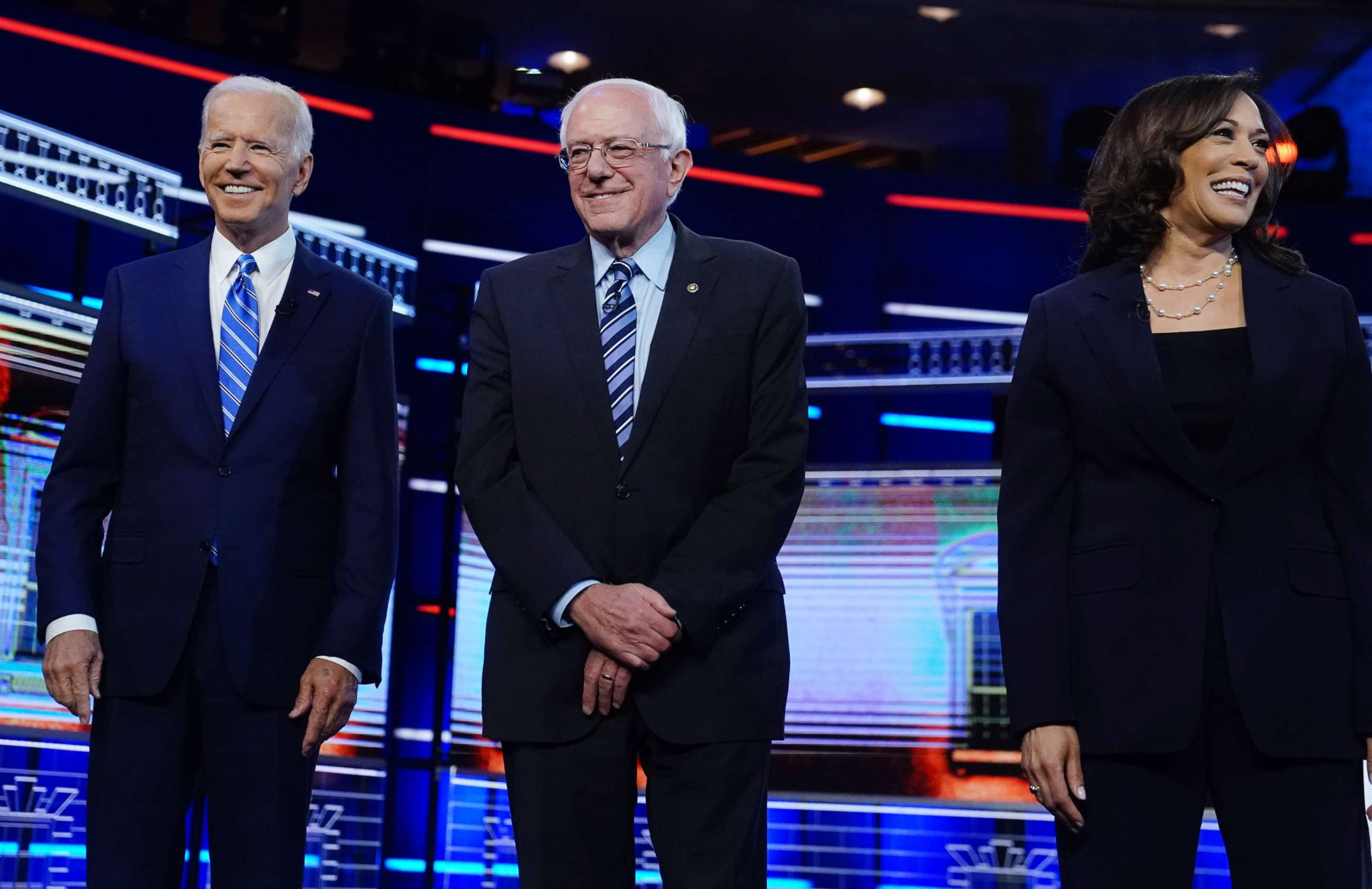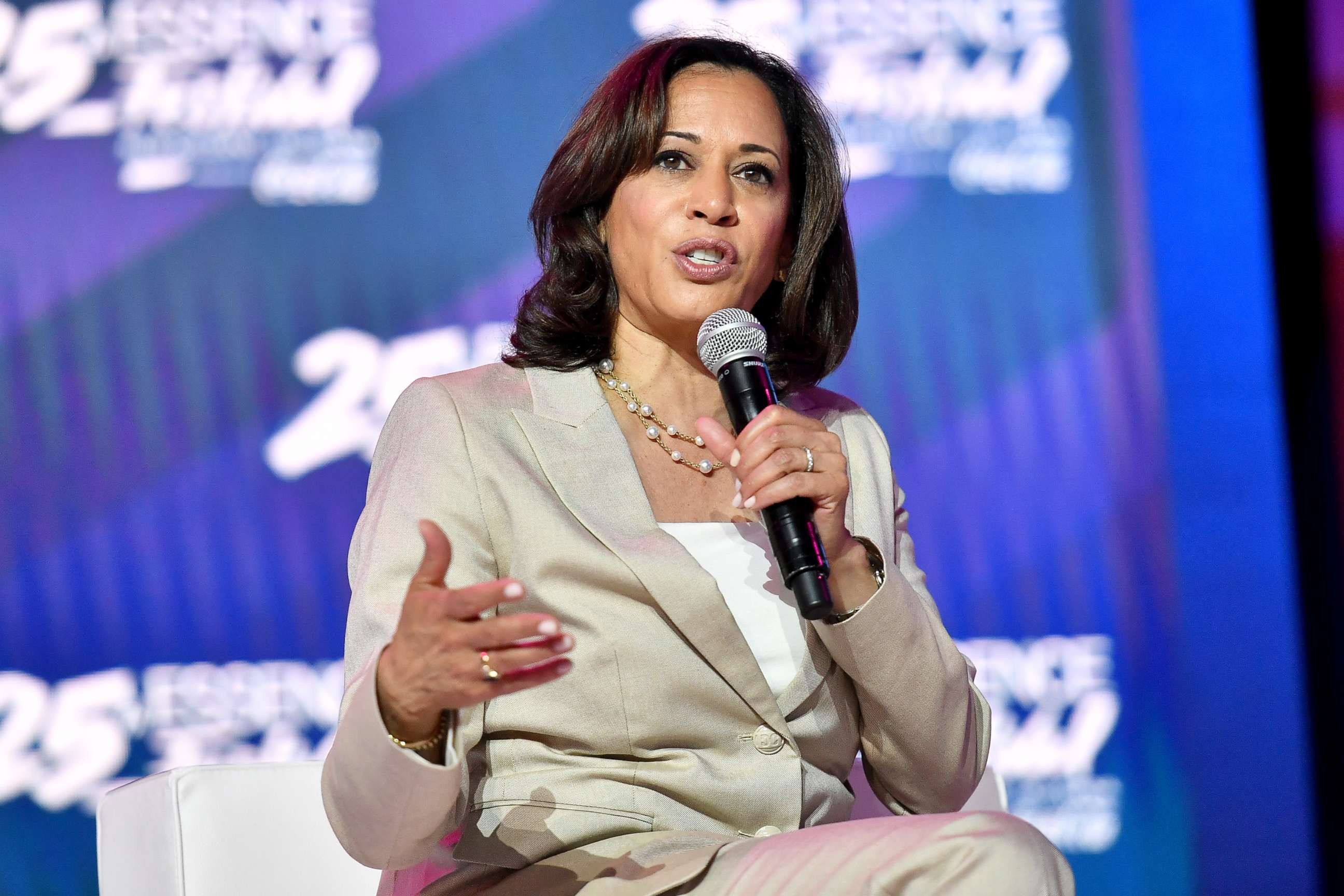The Note: Biden, Sanders spar on health care and party identity
Joe Biden is set to lay out his health care plan on Monday.
The TAKE with Rick Klein
The battle to define the ideology of the Democratic Party in 2020 is on.
The play-by-play is coming from the candidates, and President Donald Trump is providing the divisive color commentary.
Former Vice President Joe Biden on Monday will lay out a health care plan that's intended to draw sharp distinctions with his more progressive rivals. That comes two days ahead of what's being billed as a "major speech" by Sen. Bernie Sanders, framing Medicare for all as a direct challenge to insurance and drug companies.
Sanders and Biden already have been sparring on health care, with broader overtones to the fight. Biden is saying Sanders wants to raise taxes on the middle class. Sanders is accusing Biden of doing the bidding of big business interests and parroting Republican talking points.

Dividing lines along ideology and attitude have also emerged inside the Democratic House caucus on Capitol Hill; notably, Sanders took sides in that fight over the weekend. Enter Trump, who tweeted Sunday that a group of freshman members of Congress should "go back" to countries they came from, implying they are not Americans, though all, obviously, are citizens, and three were born in the United States. And with those few social media posts, the president reframed that debate entirely.
The coming days will again highlight internal Democratic divisions in ways that matter greatly for 2020. As for Trump, the president is again stoking his base -- but also reminding Democrats of the fuller stakes of the coming election.
The RUNDOWN with MaryAlice Parks
Trump continues to play games with immigration, but has few wins to his name.
This weekend, his threats of deportation raids played psychological games on immigrant communities. But as his promises of sweeping raids stoked fear and insecurity, an uptick in arrests never seemed to materialize.
In Los Angeles, the Coalition for Humane Immigrant Rights, or CHIRLA, said it monitored for elevated enforcement activity, and as of Sunday afternoon, told ABC News it hadn't seen any. Coast to coast, though, community activists said they needed to stay vigilant.
Simultaneously, the president's planned summit with Guatemala this week was postponed by officials from the Central American country. Trump was working toward a potential agreement to have Guatemala keep immigrants headed to the U.S. country while they applied for asylum, but the local legislature pushed back aggressively on the proposal before anything could be signed.
With these incomplete policy propositions on immigration hovering, Trump instead doubled down with tweets aimed at women of color in Congress on Sunday, suggesting that to him, nonwhite residents, regardless of citizenship status, should be categorized differently than other Americans. Many leading Democrats and elected officials across the country decried the president's comments as racist.
The TIP with Beatrice Peterson
It's common to see Sen. Kamala Harris greeted on the campaign trail by fellow Alpha Kappa Alpha sorority sisters, who are often wearing a shade of pink or green. This weekend, she continued to lean on historically black Greek fraternities and sororities, speaking in Atlantic City, New Jersey, at the Omega Psi Phi fraternity's international leadership conference. But the Que's made it clear this was not a formal endorsement -- due to their non-profit status, it's impossible for them or any of the other eight groups to formally support the only member of the "Divine Nine" who is running for president in 2020.
However, Harris is getting a boost from her fellow black Greeks, in the form of the Super PAC 1911 United. Formed on the centennial of the founding of Omega Psi Phi and Kappa Alpha Psi, by two members from each Greek organization, the group -- unaffiliated with the fraternities -- said it plans on using its resources, longstanding relationships and volunteer base to support Harris.

In 2011, the group, which was one of the earliest black Super PACs, was instrumental in targeting black voters for the re-election of President Barack Obama. During that effort the organization sent black volunteers across the country and, at times, traveled on a 1911-themed bus as a part of the organization's bus tour.
Founders Sinclair Skinner and Che Sayles made waves in early states, such as New Hampshire, targeting areas that had never seen a group of all-black canvassers. The Super PAC told ABC News that they do plan on targeting college students in the fall and will be back in the Granite State and in South Carolina.
THE PLAYLIST
ABC News' "Start Here" podcast.
Monday morning's episode features ABC News Chief National Correspondent Matt Gutman, who walks us through the fallout from this weekend's Immigration and Customs Enforcement operation. Then ABC News' Victoria Moll Ramirez explains why the president's racially charged tweet aimed at a group of new progressive Democratic congresswoman is playing into fears among the immigrant community. And ABC News Senior Legal Correspondent Sunny Hostin tees up Monday's bail hearing for Jeffrey Epstein. http://apple.co/2HPocUL
WHAT YOU NEED TO KNOW TODAY
Download the ABC News app and select "The Note" as an item of interest to receive the sharpest political analysis every weekday.
The Note is a daily ABC News feature that highlights the day's top stories in politics. Please check back tomorrow for the latest.



